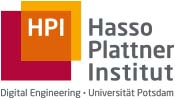The quantitative Network Model Evaluation framework
Thomas Bläsius, Tobias Friedrich, Maximilian Katzmann, Anton Krohmer and Jonathan Striebel
Towards a Systematic Evaluation of Generative Network Models
15th Workshop on Algorithms and Models for the Web Graph (2018)
Part of the Lecture Notes in Computer Science book series (LNCS, volume 10836)
You can view the paper results rendered on github within this repo:
To run nemo-eva yourself simply use Docker:
Make sure to have recent versions of Docker and docker-compose.
By default, you will use the newest docker images that correspond to the master branch. To change this, explicitly set the image tag, e.g. DOCKER_TAG=paper.
Inspect the results from the paper in interactive Jupyter Python notebooks:
DATA_PATH=/data-paper/ docker-compose run --rm --service-ports -u $(id -u):$(id -g) nemo-eva
Run various commands using mounted volumes:
docker-compose run --rm --service-ports -u $(id -u):$(id -g) dev-local
# Inside the container, you can run the following commands:
DATA_PATH=/data-paper/ python main.py
# Reruns the classification with the features used in the paper.
# This may produce slightly different results, as no seed is used.
# To run other experiments, please write a similar python script.
# This script should be improved in the future (issue #2).
make lint
make open-notebooks
make test
make …
To update the docker images, run
docker-compose pull
Or build them yourself, with
docker-compose build
Pull Requests are welcome!
Many measures have been take to make the experiments reproducible:
- Docker images make sure that all dependencies can be met and their versions are consistent.
- The analyzed networks are publicly accessible via the Network Repository.
- Intermediate results are published in this repo in paper-data.
- Tests ensure that those results can be reproduced from scratch.
- The results can be used to run custom classification experiments easily.
- The features we obtained in the paper should therefore be reproducible.
- An exception are the BA models. For those the python seed was missing in the version we used for the paper. The results are nevertheless very similar, except for the differences coming from randomization.
- The classification results differ each run very slightly, as the classification step is run without seeding.
The different stages of the experiments can be tested in the dev container with make test.
Building the docker image, running linting and tests is automated in CircleCI. This is configured here.
NeMo-Eva uses data from the Network Repository. The extracted data included in this repository is released under the same terms.
The directly imported python packages are released under the following licenses:
| library | license |
|---|---|
| aiohttp | Apache 2 |
| backoff | MIT |
| beautifulsoup4 | MIT |
| ipython | BSD |
| jupyter | BSD |
| matplotlib | BSD |
| mpmath | BSD |
| networkit | MIT |
| networkx | BSD |
| numpy | BSD |
| packaging | BSD or Apache License, Version 2.0 |
| pandas | BSD |
| plotly | MIT |
| powerlaw | MIT |
| readline | GNU GPL |
| scikit-learn | new BSD |
| scipy | BSD |
| seaborn | BSD (3-clause) |
| tabulate | MIT |
Additionally, renderjson.js is used, which is released under the ISC License.
All other parts which are created for NeMo-Eva are released under the MIT License.
